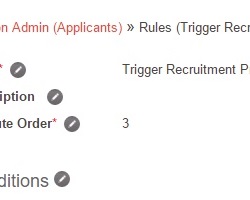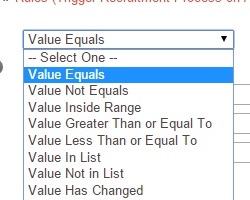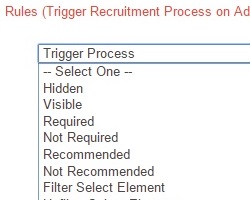Business Rules Framework
|
Does any of the following sound familiar?
- If this field equals x, and that field is greater than y, then make the third field down required. While you're at it, also hide the fourth field.
- If the logged-in user is a case worker, then show fields 5 through 10; otherwise keep them hidden.
Custom field-to-field logic is often one of the biggest time consumers of any project; either that or business rules are left out leaving online forms open to input error. EfficiencySpring will help you avoid both scenarios with its AJAX powered business rules framework. For each section, you can specify a set of rules, each with its own evaluation conditions and result outcomes.
|
 |
 |
Condition Types
EfficiencySpring supports several condition checks such as:
- Is the current user in or not in a specified user group?
- Is the current value of a field:
- equal to or not equal to a specified value?
- greater than or equal to a specified value?
- lesser than or equal to a specified value?
- Is the resulting value of a specified formula such as (##quantity## * ##price##)
- equal to or not equal to a specified value?
- greater than or equal to a specified value?
- lesser than or equal to a specified value?
- Has the value of a current field been updated or not updated?
- Is the returned data from a SQL query equal to a specified value?
|
Result Types
If a rule's conditions all evaluate to being true, then results are executed which can involve:
- Hiding a field
- Showing a field
- Making a field required
- Making a field not required
- Filtering a drop-down based on a value within the form
- Unfiltering a drop-down
- Setting a field to a new value
- Running analytical calculations in Excel and setting multiple values
- Displaying a pop-up message
- Executing custom JavaScript
- Triggering a business process
|
 |
EfficiencySpring's Business Rules framework will allow you to add significant business logic to your applications without the need to write custom server-side or client-side validation or custom interface code.